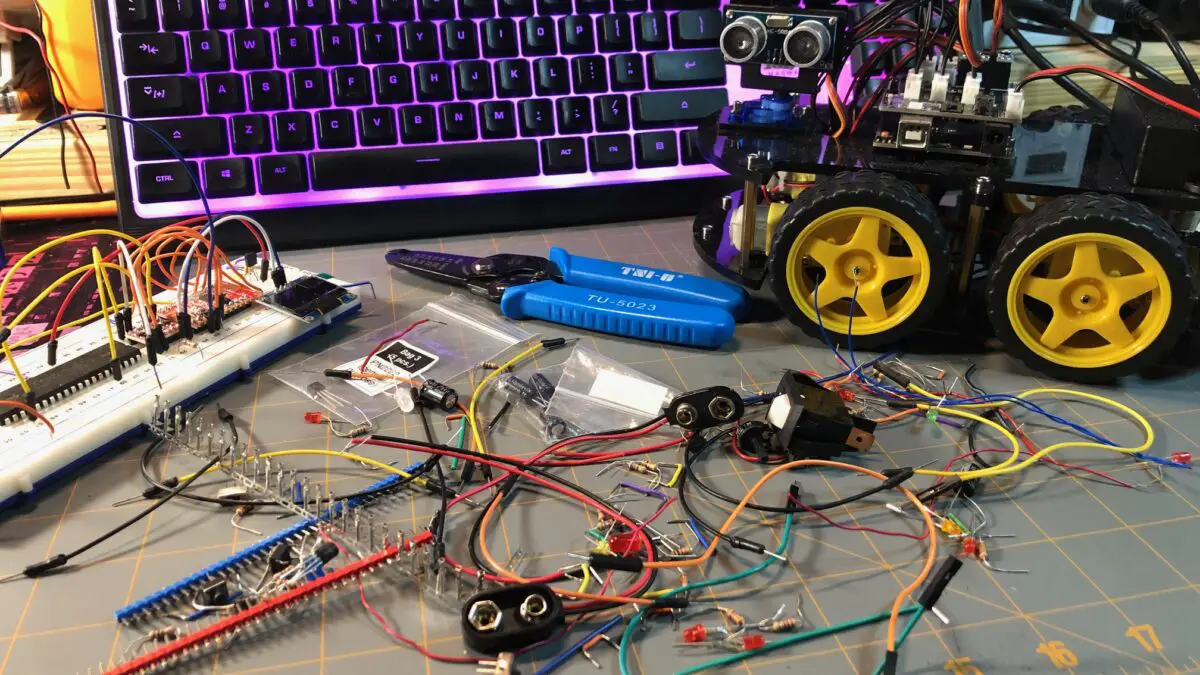
How to Get Started in Robotics without a Degree: A Complete Beginner’s Guide
To get started in robotics, you’ll obviously need an interest in robotics, you’ll need the drive to do the work to get knowledgeable about the domain of robotics, and you’ll need a can-do attitude. There’s a lot involved in learning robotics. Having the ability to lower your ego, to embrace your ignorance on subject material, and to have the discipline to put forth the effort to learn the basics will take you far in your journey in learning robotics.
You’ve seen how cool robots look in movies and TV. You’ve seen the news depict them as future helpers in industry. You are on the artificial intelligence bandwagon and think it would be awesome to someday see sentient robots walking among us. You’ve fantasized to someday build your very own robot to do things like pick up your messes, notify you when someone is at the door, to mow your lawn, to guard your home day-and-night, or to do simple, meaningful things like be a companion or a pet. Whatever your heart’s desire is in wanting to learn robotics, this beginners guide will steer you in the right direction on how to learn robotics.
Prerequisites for the Uninitiated – a Path to Success
First, we’ll start with a few prerequisites that you must have before you attempt to learn the subject of robotics. DON’T WORRY! If you’re reading this, you most likely already possess each of the following prerequisites to get you started in learning robotics. The following three prerequisites are:
1.) Interest
If you think you need an extensive background in electronics, mechanics, physics, mathematics, and computer programming to get started in learning robotics, you my friend are mistaken. Having some sort of knowledge in these are beneficial, but not absolutely necessary to get started in learning about robotics, for sure. We’ve all got to start somewhere and that somewhere begins with an interest in robotics – a path to get you started.
2.) Drive
If you have an interest in robotics, next you’ll need the drive to take the action to learn more about them and how to build them. You won’t obtain much success if you don’t have that drive. If you don’t have the drive, then your interest subsides. If your your interest subsides, then you’ll never learn much about robots nor learn how to build them – a path to nowhere.
3.) A Can Do Attitude
One of the saddest things in this world is when someone doesn’t believe in themselves enough to even try something. Learning robotics may sound intimidating and it may feel overwhelming to push through that mental blockade that prevents us from getting started in robotics, but know you can do it. That’s exactly what you need, a can do attitude – a big step toward the path of robotics.
Getting Started in Robotics
Okay, now that we’ve gotten the prerequisites out of the way, let’s get right to it. How to get started in robotics without a degree? Here’s a list of 8 ways to get you started in robotics as a beginner:
- Embrace Your Ignorance: Approach robotics knowing that there will be things you simply do not know; embrace your ignorance on subject material and learn to be patient with yourself. Let go of preconceived notions and expectations, and be eager to learn and explore.
- Start with Basic Electronics: Robotics requires several different skills. The most obvious and important skill being electronics. Before diving into robotics, it’s important to have a solid foundation in electronics. Familiarize yourself with concepts like voltage, current, resistance, component diagrams, circuits, and sensors.
- Learn a Programming Language: Programming languages are used extensively in robotics. The most common are C, C++, Python, and Arduino. Don’t get too caught up in choosing which programming language to learn first though, if you don’t have experience. What’s important is to learn just one to start off with. Once you understand the basic concepts of a programming language you should have no trouble in being able to understand another language. If I were to give a recommendation as to which programming language to start with, it would be Python, since it is an easy language to learn and there are lots of resources available to help you learn.
- Read Robotics Books, Magazines and Blogs: Delve deep into the wonderful world of robotics by reading books, magazines and blogs. Some recommended books include “Robot Building for Beginners” by David Cook and “Robot Builder’s Bonanza” by Gordon McComb. Magazines like Nuts and Volts, Servo, and Elektor offer lots of great articles on electronics and robotics, as well as provide DIY projects. Blogs like RobotShop or Dronebot Workshop offer insightful articles and resources as well.

- Watch YouTube Videos: YouTube offers a plethora of video content on robotics. There are many great content makers that do everything from talk about robotics to teach you how to build your own. Some great content makers that give advice on getting started in robotics are Liz’s channel Learn Robotics and Sina’s Robotix with Sina. Content creators who are more hands-on in teaching you robotics are Bill’s Dronebot Workshop, and Paul’s channel, by his own name, Paul McWhorter.
- Take Online Courses or Tutorials: There are many online courses and tutorials that you can take advantage of online. Many free courses and tutorials are on YouTube, such as Paul McWhorter’s Introduction to Robotics and Robots for Beginners Tutorial, Stanford’s Introduction to Robotics, and Northwestern Robotics’ course on Modern Robotics. There are many other formats to take courses on robotics such as edX, Coursera, and udemy which provide some free courses and material, but there are paid courses as well, for a small fee.
- Experiment with Robotics Kits: Start with beginner-friendly robotics kits that provide step-by-step instructions and all the necessary components. These kits often include pre-designed robots that you can assemble and program yourself, allowing you to gain practical experience in building robots. Some great robot kits can be found at places like Jameco.com in their Jameco Robot Store. Robotshop.com has a great variety of robotics projects and supplies, and both theirs and Jameco’s customer service are excellent. You can also find a great variety of robotics kits at MakerShed.com, where there are many things to get you started in both robotics and electronics learning.
- Attend Robotics Workshops and Meetups or Create One of Your Own: Search around via Google, Meetup.com or even Facebook for local robotics workshops or meetups in your area. These types of events provide opportunities to learn from experts, allows you to participate in hands-on activities, and allows you to network with other robotics enthusiasts. If you’re in a location that doesn’t offer much in terms of finding local meetups or ones closest to you are too far away, try to develop your own meetup and spread the word. You never know, there might be people close by who have the same interest in robotics as you who also wish to meet with like minded people.
Where to Go From Here?
- Buy books on electronics, robotics, and a programming language to start learning the basics of each concept. Try buying used books if you can. They’re much cheaper than buying new books. Great places to search for used books on robotics is at ThriftBooks.com, BetterWorldBooks.com, or even eBay.
- Absorb as much content on robotics as you can. YouTube contains an enormous amount of video content on robotics – like our Motbots YouTube channel! Try out the many free courses available on YouTube from small content creators to well know universities like Stanford or even MIT!
- Get Started in Making a Simple Robot. The best way to really learn something new is by getting your hands involved by making something of your own. You don’t have to start out with anything complicated, you can start off with something as simple as this robot build here.
- Try to meetup with other like minded people who have similar interests as you in robotics. Having people you can talk to about robotics, as well as possibly build robots with makes the experience of robotics all the more worthwhile and fulfilling.
